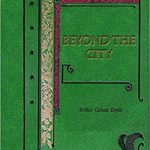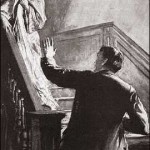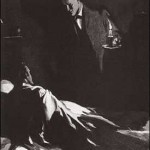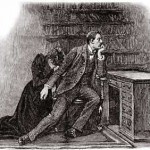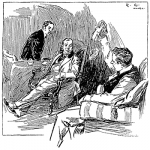“That, also, is still obscure. But we have learned a good deal, you perceive. We know that a man stood in the road looking at the quarrel between the Barclays — the blinds were up and the room lighted. We know, also, that he ran across the lawn, entered the room, accompanied by a strange animal, and that he either struck the colonel or, as is equally possible, that the colonel fell down from sheer fright at the sight of him, and cut his head on the corner of the fender. Finally we have the curious fact that the intruder carried away the key with him when he left.”
“Your discoveries seem to have left the business more obscure than it was before,” said I.
“Quite so. They undoubtedly showed that the affair was much deeper than was at first conjectured. I thought the matter over, and I came to the conclusion that I must approach the case from another aspect. But really, Watson, I am keeping you up, and I might just as well tell you all this on our way to Aldershot to-morrow.”
“Thank you, you have gone rather too far to stop.”
“It is quite certain that when Mrs. Barclay left the house at half-past seven she was on good terms with her husband. She was never, as I think I have said, ostentatiously affectionate, but she was heard by the coachman chatting with the colonel in a friendly fashion. Now, it was equally certain that, immediately on her return, she had gone to the room in which she was least likely to see her husband, had flown to tea as an agitated woman will, and finally, on his coming in to her, had broken into violent recriminations. Therefore something had occurred between seven-thirty and nine o’clock which had completely altered her feelings towards him. But Miss Morrison had been with her during the whole of that hour and a half. It was absolutely certain, therefore, in spite of her denial, that she must know something of the matter.
“My first conjecture was that possibly there had been some passages between this young lady and the old soldier, which the former had now confessed to the wife. That would account for the angry return, and also for the girl’s denial that anything had occurred. Nor could it be entirely incompatible with most of the words overheard. But there was the reference to David, and there was the known affection of the colonel for his wife to weigh against it, to say nothing of the tragic intrusion of this other man, which might, of course, be entirely disconnected with what had gone before. It was not easy to pick one’s steps, but, on the whole, I was inclined to dismiss the idea that there had been anything between the colonel and Miss Morrison, but more than ever convinced that the young lady held the clue as to what it was which had turned Mrs. Barclay to hatred of her husband. I took the obvious course, therefore, of calling upon Miss M., of explaining to her that I was perfectly certain that she held the facts in her possession, and of assuring her that her friend, Mrs. Barclay, might find herself in the dock upon a capital charge unless the matter were cleared up.
“Miss Morrison is a little ethereal slip of a girl, with timid eyes and blond hair, but I found her by no means wanting in shrewdness and common sense. She sat thinking for some time after I had spoken, and then, turning to me with a brisk air of resolution, she broke into a remarkable statement which I will condense for your benefit.
” ‘I promised my friend that I could say nothing of the matter, and a promise is a promise,’ said she; ‘but if I can really help her when so serious a charge is laid against her, and when her own mouth, poor darling, is closed by illness, then I think I am absolved from my promise. I will tell you exactly what happened upon Monday evening.
” ‘We were returning from the Watt Street Mission about a quarter to nine o’clock. On our way we had to pass through Hudson Street, which is a very quiet thoroughfare. There is only one lamp in it, upon the left-hand side, and as we approached this lamp I saw a man coming towards us with his back very bent, and something like a box slung over one of his shoulders. He appeared to be deformed, for he carried his head low and walked with his knees bent. We were passing him when he raised his face to look at us in the circle of light thrown by the lamp, and as he did so he stopped and screamed out in a dreadful voice, “My God, it’s Nancy!” Mrs. Barclay turned as white as death and would have fallen down had the dreadful-looking creature not caught hold of her. I was going to call for the police, but she, to my surprise, spoke quite civilly to the fellow.
” ‘ “I thought you had been dead this thirty years, Henry,” said she in a shaking voice.
” ‘ “So I have,” said he, and it was awful to hear the tones that he said it in. He had a very dark, fearsome face, and a gleam in his eyes that comes back to me in my dreams. His hair and whiskers were shot with gray, and his face was all crinkled and puckered like a withered apple.
” ‘ “Just walk on a little way, dear,” said Mrs. Barclay; “I want to have a word with this man. There is nothing to be afraid of.” She tried to speak boldly, but she was still deadly pale and could hardly get her words out for the trembling of her lips.
” ‘I did as she asked me, and they talked together for a few minutes. Then she came down the street with her eyes blazing, and I saw the crippled wretch standing by the lamp-post and shaking his clenched fists in the air as if he were mad with rage. She never said a word until we were at the door here, when she took me by the hand and begged me to tell no one what had happened.
” ‘ “It’s an old acquaintance of mine who has come down in the world,” said she. When I promised her I would say nothing she kissed me, and I have never seen her since. I have told you now the whole truth, and if I withheld it from the police it is because I did not realize then the danger in which my dear friend stood. I know that it can only be to her advantage that everything should be known.’
“There was her statement, Watson, and to me, as you can imagine, it was like a light on a dark night. Everything which had been disconnected before began at once to assume its true place, and I had a shadowy presentiment of the whole sequence of events. My next step obviously was to find the man who had produced such a remarkable impression upon Mrs. Barclay. If he were still in Aldershot it should not be a very difficult matter. There are not such a very great number of civilians, and a deformed man was sure to have attracted attention. I spent a day in the search, and by evening — this very evening, Watson — I had run him down. The man’s name is Henry Wood, and he lives in lodgings in this same street in which the ladies met him. He has only been five days in the place. In the character of a registration-agent I had a most interesting gossip with his landlady. The man is by trade a conjurer and performer, going round the canteens after nightfall, and giving a little entertainment at each. He carries some creature about with him in that box, about which the landlady seemed to be in considerable trepidation, for she had never seen an animal like it. He uses it in some of his tricks according to her account. So much the woman was able to tell me, and also that it was a wonder the man lived, seeing how twisted he was, and that he spoke in a strange tongue sometimes, and that for the last two nights she had heard him groaning and weeping in his bedroom. He was all right, as far as money went, but in his deposit he had given her what looked like a bad florin. She showed it to me, Watson, and it was an Indian rupee.
“So now, my dear fellow, you see exactly how we stand and why it is I want you. It is perfectly plain that after the ladies parted from this man he followed them at a distance, that he saw the quarrel between husband and wife through the window, that he rushed in, and that the creature which he carried in his box got loose. That is all very certain. But he is the only person in this world who can tell us exactly what happened in that room.”
“And you intend to ask him?”
“Most certainly — but in the presence of a witness.”
“And I am the witness?”
“If you will be so good. If he can clear the matter up, well and good. If he refuses, we have no alternative but to apply for a warrant.”
“But how do you know he’ll be there when we return?”
“You may be sure that I took some precautions. I have one of my Baker Street boys mounting guard over him who would stick to him like a burr, go where he might. We shall find him in Hudson Street to-morrow, Watson, and meanwhile I should be the criminal myself if I kept you out of bed any longer.”
It was midday when we found ourselves at the scene of the tragedy, and, under my companion’s guidance, we made our way at once to Hudson Street. In spite of his capacity for concealing his emotions, I could easily see that Holmes was in a state of suppressed excitement, while I was myself tingling with that half-sporting, half-intellectual pleasure which I invariably experienced when I associated myself with him in his investigations.
“This is the street,” said he as we turned into a short thoroughfare lined with plain two-storied brick houses. “Ah, here is Simpson to report.”
“He’s in all right, Mr. Holmes,” cried a small street Arab, running up to us.
“Good, Simpson!” said Holmes, patting him on the head. “Come along, Watson. This is the house.” He sent in his card with a message that he had come on important business, and a moment later we were face to face with the man whom we had come to see. In spite of the warm weather he was crouching over a fire, and the little room was like an oven. The man sat all twisted and huddled in his chair in a way which gave an indescribable impression of deformity; but the face which he turned towards us, though worn and swarthy, must at some time have been remarkable for its beauty. He looked suspiciously at us now out of yellow-shot, bilious eyes, and, without speaking or rising, he waved towards two chairs.
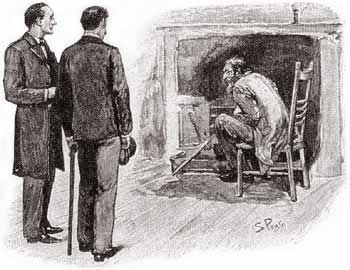
“Mr. Henry Wood, late of India, I believe,” said Holmes affably. “I’ve come over this little matter of Colonel Barclay’s death.”
“What should I know about that?”
“That’s what I want to ascertain. You know, I suppose, that unless the matter is cleared up, Mrs. Barclay, who is an old friend of yours, will in all probability be tried for murder.”
The man gave a violent start.
“I don’t know who you are,” he cried, “nor how you come to know what you do know, but will you swear that this is true that you tell me?”
“Why, they are only waiting for her to come to her senses to arrest her.”
“My God! Are you in the police yourself?”

